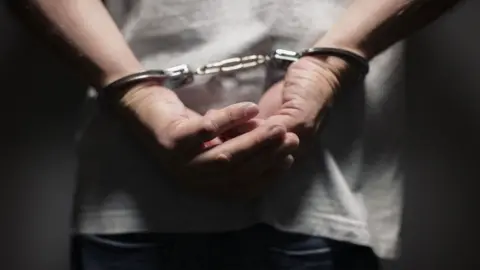Police calls for mental health issues up by a third
 Getty Images
Getty ImagesCalls to the Metropolitan Police about mental health have risen by almost a third in five years, figures show.
There were 115,000 calls with a mental health element to London's police force in the 12 months to July.
That compares to 86,520 in 2011-12 and equates to about 315 a day.
Call-outs included to people involved in or suspected of crime, those in crisis, support to other emergency services and local council health assessments.
Forty thousand of the calls had a police unit assigned - or sent out - to them, the detail showed.
The calls were a mixture of emergency 999 and 101 calls.
Of those, 13,000 related to mental health hospitals, of which 4,000 have a unit assigned.
The Met received almost five million 999 and 101 calls in the same period.
Commander Richard Smith, head of safeguarding at the Metropolitan Police Service, said one-in-four Londoners would experience "a diagnosable mental health condition" in their lifetime and that included the "large number of people" held in custody who would need an assessment and a care plan.
Use of Section 136 of the Mental Health Act was also up - the emergency police power to take someone into a safe place when they are out in public.
Police said it was up about 10 per cent each year, and could double in London during the next 10 years.
The Met can take up to 400 people detained under section 136 to a place of safety each month.
'More to do'
Labour's police spokeswoman Louise Haigh MP said people on long waiting lists for mental health help were turning to the police as a service of last resort.
"While facing a savage cut in numbers the police are increasingly being asked to pick up the pieces of a scandalous lack of mental health provision," she said.
A Department of Health spokesperson said there had been "major improvements" to mental health support in recent years - including setting up access and waiting standards and increasing spending to £11.6bn in 2016/17.
But the spokesperson said there was "more to do" and the government was working with NHS England to improve access to services across the country.
Mental health co-ordinator for the College of Policing Insp Michael Brown said: "It is critical that we have effective partnerships with health care providers so that we better understand the reasons why people with mental health issues are coming into contact with officers.
"Our role is to protect vulnerable people from harm and where necessary to work with other agencies to keep them safe."
He added that new police guidelines for training officers were published last year.
